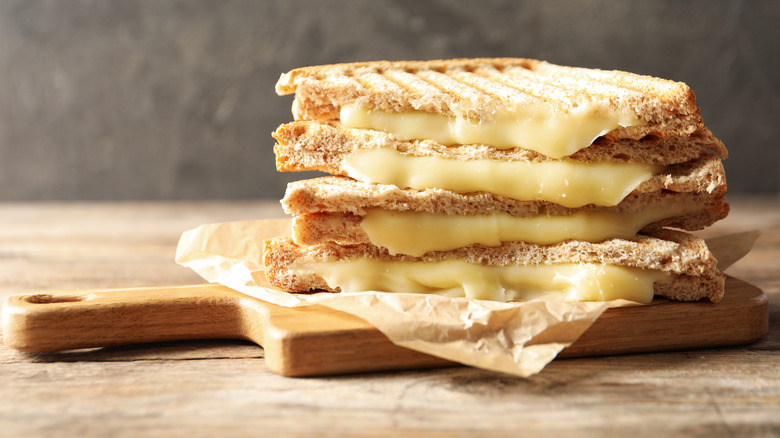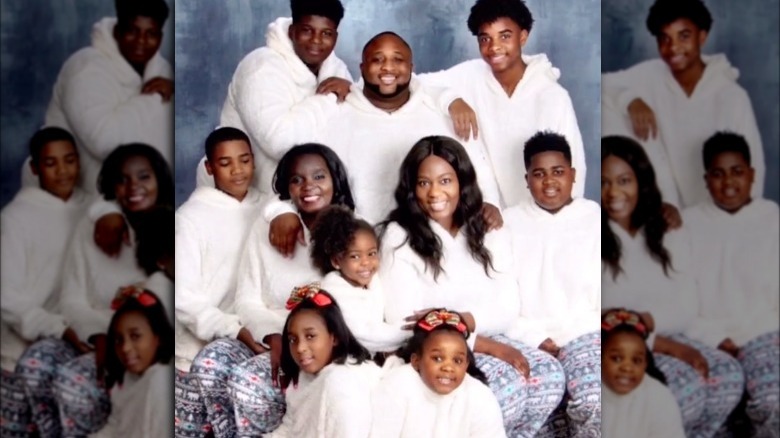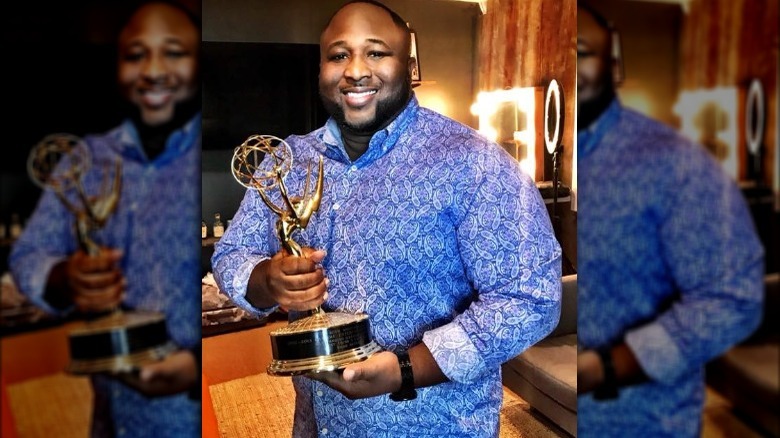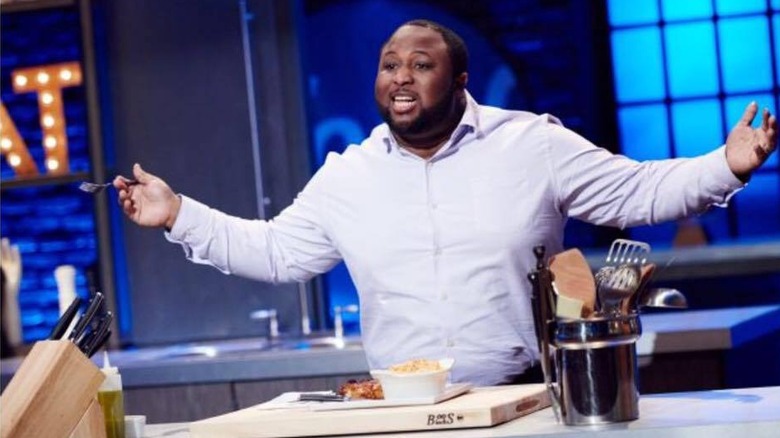Jernard Wells Dishes On His New Show, New Soul Kitchen Remix - Exclusive Interview
We may receive a commission on purchases made from links.
James Beard award-winning chef Jernard Wells knows a thing or two about cooking for kids – he and his wife have nine of them, and collaborating in the kitchen is a family affair. Not only does the frequent Food Network guest enjoy feeding his own children, but he's actually in a food competition with another child: the precocious 12-year-old Julian Frederick, who is co-founder and CEO of a kid cooking company called Step Stool Chef. Wells and Frederick will be (playfully) competing in a grilled cheese cook-off using Truly Grass Fed cheese on October 20 hosted by Slow Food Live.
As much as Wells loves cooking for, with, and, well, against kids, you might say Wells' real "baby" has been his passion for re-interpreting traditional soul food dishes, which he shares on his Cleo TV shows, "New Soul Kitchen," and the new "New Soul Kitchen Remix," airing its second season on October 27. In an exclusive interview with Mashed, Wells explained how, exactly, he "remixes" soul food, and also offered cooking tips, including how to make a (hopefully contest-winning) grilled cheese sandwich.
How Jernard Wells plans to win the grilled cheese cook-off on Slow Food Live
Tell us more about the grilled cheese cook-off, and why you're facing off against the young chef Julian Frederick.
Julian is a young, young chef that's based out of Texas — an amazing young chef. It almost seems like he could be a family member because I started young just like he did. So, it's just so inspiring to see young, talented, talented children, or young adults. Let me call him that: a young adult following in the same footsteps of what I desired when I was younger. Now it shows the youth that it is possible because I started cooking earlier.
Why did you decide to do this grilled cheese cook-off?
The cool thing about the grilled cheese cook-off, of course, is with Truly Grass Fed, [it's] some of the best cheese. Because look, we've known that their cows are 95% grass-fed. If you really care about anything that you putting in your body, those are things that you pay attention to.
I say that, and one of the reasons why I stand with them and what they're doing and also being a part of Slow Food USA, is the fact that over the course of the years, I really started focusing and honing in on not only what I was creating for myself, but what I was creating to serve to others. I started ... diving into that, and that spectrum of the food world, because it has its own unique niche. [T]alking about grass-fed cows, one of the things we know we're coming out of Ireland ... I think it's roughly about 3,000 Irish families or Irish farmers. We know some great cheese com[ing] up out of Ireland, as well as butter. So, to be able to have those combinations together, and being a Southern chef, I love cheese! Look, I don't care whether it's grilled cheese or mac and cheese or just charcuterie board cheese. When we talk about cheese, that speaks my language!
So, for me and chef Julian to come together and do this, I think it speaks volumes on where we have arrived in the culinary world, and something that's I guess as simple as a grilled cheese, how unique can you make it? Because we're going to be throwing down some cool dishes! I've been playing with some grilled cheese because I'm like, "I really want to make this really exciting, what I do grilled cheese-wise?" I guess I would have to say probably if it's just me at home and no one's around, my guilty pleasure is just a plain grilled cheese and tomato basil soup.
What is your secret to the very best grilled cheese?
I would have to say my secret to the very best grilled cheese, of course, one, is always about the cheese. The cheese that you use. There's so many options of cheese, but the key is ... So, it's in a good cheese that has some nice grilled flavor...you always want to have your nice, good cheddar. I think that's a strong key when it comes to cheeses is what cheese you have, how meltable the cheese is, because see, if you get a cheese that takes too long to melt or that doesn't quite melt, what you'll end up doing is burning your bread or making a bread too dark trying to get that proper texture that you want.
The other thing, one of my secrets ... I guess the secret that ain't a secret, but what I like doing, also, regardless of whatever bread I use, I like searing both sides. What I mean is, the inside of the bread and the outside. So, I started with searing my outside, and then add my cheese to that seared part–so you get that crunch, and then the creaminess and the velvety-ness of the cheese. It's all about the pull.
What it's like to cook for nine children, according to Jernard Wells
So, you have nine children. What's that like?
Yeah. Five girls and four boys. I have been with my wife for 23 years. Actually, as I always tell people, it's been feeling kind of weird lately, because we have five of them. We have one that just went off to college, I guess two months ago. So, now we have four that are still at home. We have three in high school and the last one in middle school. It feels so weird because we're used to having a big family and all the kids around us, even with the fact that we actually were excited because we were able to downsize the vehicles, because we'd been traveling in big vehicles for so long to be able to get just a four-door sedan or a smaller SUV ... That was an accomplishment for us, but it's really cool.
People always ask [about] my TV shows: "How do you just bring it out, and you can just talk, talk, talk?" I said, "If you surround [anyone] with as many children as I have, it's going to come out regardless, because at any given time, at one point, no matter what room I walked into, it was something always interesting going on. I would go in the kitchen, and I got two in there cooking. I go in another one. They got Disney playing. I go in another one. They're jamming music. It's always them being wonderful entertainers. So, it was never a dull moment in my house and still isn't, actually!
Is there one dish that all nine of them love that you make?
The dish that all of them love, I think, from top to bottom, is my lobster and andouille sausage mac and cheese. Yes. Oh my goodness. Yeah. I think hands down [that] is probably been one of my most requested dishes, all the way to the time of when I did "Food Network Star." They had to do this signal with Bobby [Flay] and Giada [Di Laurentiis] that was called, "A dish to my life." That was one of the dishes that I made, and it's because it became my family's and children's staple — because it was my staple. My great-grandparents fixed that dish.
So, when we talk about mac and cheese, it's always about the bechamel. The bechamel, that creaminess, that cheesiness, making that roux, cooking the butter and the flour, and adding in the cream and the cheese. That's what really brings it together.
Then of course, me being a Southern boy raised up in Mississippi, and always around seafood, it was common at any given time [to put] shrimp in there, lobster, crab. It's something. It was something that was standard for us, and that's a go-to dish now in my house that I have to say at least three to four times a month.
Do your children ever cook with you?
They do. That's one of the cool things. I got all these different personalities, so I never really tried to push what my passion was off on them. I want them to find that zen within themselves. That's actually how my father did, even though he was a chef. I think it was a set up: he always had me thinking it was my idea while I was hanging with him in the kitchen! Then lo and behold, I became one, and that's really what I do with my children, whereas I started out years ago, bringing them in the kitchen and cooking with me and just having fun. Then I rolled it into theme nights where every Friday and Saturday, I typically let them choose what the meal is and go grocery shopping, let them pick whatever they want, and then allow them to create it. Regardless of how it turns out, I still had to sit and smile away. "Oh yeah. It's so good."
But for the vast majority of the time, it's always a great meal. It's just so inspiring just seeing how the creativity of what the youth create, what they cook and create now has really changed. I guess it's because they have so much to experience on the palette, versus when we were coming up and growing up. So, it allows their taste buds to be just so unique. I got a few of [their dishes] that I'm amazed by. Especially my 11-year-old [who] eats blue cheese crumblese! As a kid, they'd be like, "Ah, blue cheese." Yeah, but shoot, she's craving it, and I didn't realize that. I would have them in my refrigerator and they would go missing. That's when I discovered it.
Then I really saw that they were into it, because some of my cheese that Truly Grass Fed sent to me ... I came in the house over the weekend — these jokers had done built a charcuterie board with some of my cheese! I was like, "That's my cheese." They even built a charcuterie board. They got cheeses spread out, crackers and grapes, then had the sparkling grapefruit cider. I was like, "Dang. They been seeing Dad entertain too much!"
Jernard Wells discusses the highlights of his career, including his James Beard award
What it was like to win the James Beard award?
I was one of the featured chefs, or the honored chef, to come cook at the house, the James Beard House, and it's one of those once-in-a-lifetime experiences. That was something that I had been desiring, I know, for probably the past 15 years out of my 22 years of being a certified chef. And to get that call to see that they actually noticed me as I always say, a Southern boy in the South, but to see them notice me and say, "Hey, we see you. We love what you're doing, and we want to create this whole amazing event around you." It was truly spectacular ...
So, to have that experience at the James Beard House, then to see ... so many people lined up around the block where they sold out, because James Beard, of course, is a not-for-profit. It's always for a worthy cause, for chefs and scholarships that are in my field. And just to see that many people in New York and from the surrounding areas, Jersey and places like that, to come in to celebrate me, it meant a lot. It meant a lot to me, and my life will never be the same after that.
Has that been the best moment in your career so far?
I think probably one of them. I think my best moment, or my biggest accomplishment that I feel thus far, is landing and having my own show. That was my biggest thing, because even though I still moonlight with Food Network, and Food Network is still my family, to be able to get the opportunity ... TV One and NBC, Comcast NBC, created that sister network, Cleo TV, and to be one of the first chefs to have that opportunity, to be tapped and come and lead my own show, "New Soul Kitchen," and actually going into the four seasons. So, it's been four years...Then from there, to go on, and my show becomes the number one show on the network — that is a blessing right there because we know there's a lot of competition and they have a viewership of over 39 million. So, to be topping the charts and maintain over the course of the past four years, to have the number one show — then, from there, it led to me getting my second show, "New Soul Kitchen Remix."
How Jernard Wells' formal training influences his interpretation of soul food
Why are your Cleo TV shows called "New Soul Kitchen"? Are they about soul food?
[When] people hear "New Soul Kitchen," it's not soul food or anything like that, because my culinary background is French and Cajun cuisine. That's what I majored in, studied in, and then traveled around the world and worked for chefs in different places, just to learn from Asian and all these other different styles, but to have the ability to share my culinary point of view and how I see food. That's what I always tell people. We are painting the picture with our plate, because we know culinary arts is exactly what it is: it's an art form. It's about sharing the art, and the creativity, just like painting a canvas except we [are] painting it with our plate. How I see food, how I taste food.
That's why I always tell people the best way to cook is never to ask the person what they like. What you always do, is you find out the taste bud standards. Do you like it sweet, spicy, savory, umami? Those kinds of things. Then it's okay to create a meal like that, but you always want to create it from your perspective, because when I taste your food it's meant for me to experience you or the hands that created it, because that's how we talk or speak language through food.
How does a home cook sort of apply that lesson in their own kitchen? How do you know what your own perspective is as a cook?
The biggest way to determine your perspective? Of course, we always know the foundation of what you cook is always about where you [come] from. We can't run or hide from that, because where you're from or where you originated, is how you grew up eating food, what you experienced. So, even though you can go and get trained in French technique, the Italian technique, Asian — your foundation, just like a house, is going to always shine or show through that, because it's the way you see recipes.
For a home cook, what I always suggest is ... not to be afraid to open their palate up. When I say open your palate up, experience things that you typically ... or taste things that you didn't taste growing up, or wherever you are in your life right now. By experiencing those things, that's how you start setting the boundaries on your palate up. [You will say to yourself,] "Oh, I like this. I like how I felt after eating this. I liked the experience or the tingling-ness of the tongue. Oh, that was too spicy. I would cut down on the heat of it. Ooh, I like the savoriness, the tanginess of it."
So when you start, because you know, we are creatures of habit, and we're going to eat what we are accustomed to eating, regardless. So, that's an understatement. The gist is to elevate your palate. [To] become a great cook is to try the things that you normally wouldn't. If you ...don't normally don't eat Vietnamese food ... go to a Vietnamese [restaurant], go to it intentionally. If you don't eat Ethiopian food, go to an Ethiopian restaurant intentionally. If it's Greek food, those things, you do it intentionally. Force yourself to experience those things.
How Chef Jernard Wells became a cook
Before you were professionally trained, who taught you how to cook?
My mother and my father. My mother: the irony! She was a pastry chef but also a nurse for the state of Mississippi for 20 some odd years. My father was a chef, and my parents had ended up in Mississippi. I was born and raised in my early years in Chicago, and my great grandparents own 200 acres of land, farm land in Mississippi. So, my parents felt that it would be a great idea to put me through that culture shock, taking me from the big city ... to the South and learn, but it really taught me, learning to work on a farm. That's why I really value it so much when I talk about Truly Grass Fed ... one cow per two acres of grass to eat. That's a luxury right there. They fall into this sustainability at 1%.
So, those things of growing up on their farmland: my grandparents raised cattle, raised chicken, freaking little mini goats. I used to always name the goats. Look, they were my friends until they were around me when my back was turned, [trying to] knock me down in the mud or something. The smokehouses, aging cheeses, all those things ... It taught me and trained me a lot before I ever invested money to go to culinary arts school.
Did going to culinary arts school change your strategy with any of these foods that you grew up learning how to cook, or do you stick to the recipes your parents taught you?
Going to culinary arts school, as I was saying earlier, when you asked me about home cooking, I feel was the "cheat code". I gave the cheat code to you, and the cheat code with culinary arts school, because my parents and grandparents had taught me so much about cooking and creating it, but they were teaching me from their dimension of what was around me. When I later went to culinary arts school, it pushed me into trying and forcing me, of course, because you won't pay us to experiment and try dishes and try things that I normally wouldn't have. So, what that did, it allowed me to take the blinders off, [and] really taste and see cuisine. Then all it did was enhance everything that [my parents] had already shared and instilled with me.
When I stepped out of the box and really immersed myself into experiencing every kind of ethnic background, when it comes to cuisine ... it changed the style of my creation and how I fix food. Some people call it a "fusion," but what happens is when you learn so many different cuisines and study so many different cuisines, your mind — or my mind, more so — just becomes a melting pot. So, there's always a fusion or better yet a mashed-up style of creating the dish.
How you can lose weight while eating Southern food, according to Jernard Wells
You wrote a book called, "Southern Modified," which offers lower-calorie versions of your dishes. Can people actually lose weight and eat their favorite Southern foods?
I always tell people on my cooking show the best way to eat food and lose weight is eat with a fork because all the calories fall through the cracks.
Maybe we should eat Oreos with a fork!
I know, right? But on a serious note, that was one of those journeys that I embarked upon myself, because earlier on in my career, when I first started, I finished culinary arts school. I won a chef's competition at the Resorts Casino, and part of winning that competition was I got to create everything, the recipes and dishes that were on the menu. Of course, with creating, it's all about consistency. The way I create it, I have to train all the staff, 50 some chefs, to create it to taste the same way. That means I have to taste it over and over ... and over! So, going through tasting 30 to 40 dishes a day, just because you're putting a spoonful in your mouth. In my mind, I'm thinking, "Man, I ain't even ate dinner." Then when I get home, my wife had cooked a full meal. Then I eat, and one day I just woke up and had blown up big as I don't know what.
So, after years of doing that, I was like, "I got to change this." So, I was like, "I know what I love. I know what I like to eat. Let me just start creating recipes to modify." Because I do believe that we can have our cake and eat it too, but it's about eating in moderation and the key is not to overeat. You have to garner or gain some form of discipline, where I want to eat what I enjoy, but I need to know where to stop. I need to know if I'm eating light on so many calories for the morning being, "I can fluff a little bit during the daytime." What I always say is when you're on lifestyle journeys, because they stopped calling them "weight loss journeys," because weight can fluctuate, go up and down. When you're on a lifestyle journey, what you do is change your whole lifestyle. You change everything that's around you. Even change the way you grocery shop, the foods that you bring in, the stuff that you eat, how it's breaking down in your body.
One of my all-time favorite dishes that is in "Southern Modified" is my baked fried chicken. I did that segment [on] the show "The Doctors"... And that's what I do, bake-fry because I'm from the South. I'm from the South, and fried chicken was probably my number two guilty pleasure outside of a good grilled cheese. I was like, "I want to get rid of the trans fats," because I knew it was the flour and all those things that combine together to make it not be as healthy for you.
So, with me wanting that crunch texture, that's when I [added] cheese to it. Because if you saw the recipe, I add Parmesan cheese to it, bread crumbs, then bake it off and it allows it to get that nice, beautiful crust to it where it satisfies that crunch and that bite. But then on the inside, [I] got a beautifully baked chicken that's nice and tender, and I baked over half the trans fats out of it. Then do it skinless as well, because that coating acts as that bread. So, those are the things that I started applying to my life. By doing that — man, I lost over 60 some pounds and feel good! And after doing it so long it just becomes a way of life.
Watch Chef Jernard Wells and 12-year-old Julian Frederick compete on "Say (Grilled) Cheese! A Family-Friendly Cookoff" on Slow Food Live on October 20. The fourth season of "New Soul Kitchen" airs on October 27 at 7:30 p.m. Eastern on the Cleo Network.






